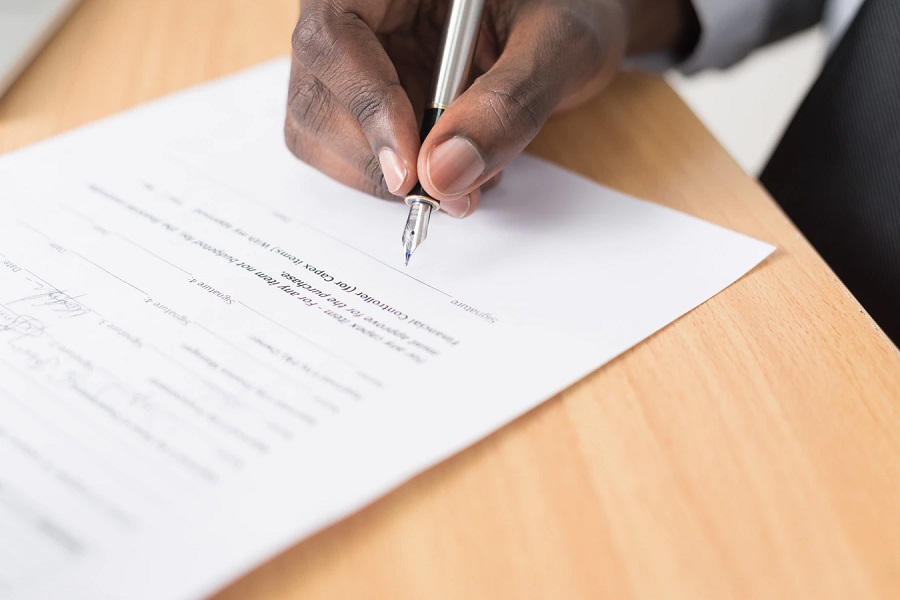How to Prepare and Notarize a Will

Creating a will isn’t complicated, but it’s important to prepare it correctly and have it officially notarized. Failure to notarize it will mean it isn’t valid. Follow these steps to be sure your will can speak for you when you no longer can.
Why Do You Need a Will?

The most popular reason to have one is creating a structure of asset distribution among your family members and your close circle. You should consider writing a will if you:
- have some property and money, and you want to choose who gets your assets when you die.
- have a will, but you want to change it.
- travel frequently or have a high-risk job.
- just bought a home, got married, had a child, or went through another major life event.
How To Prepare a Will
Writing a will involves several steps. Your document must include:
- An introduction explaining who you are.
- Your executor.
- Your beneficiaries.
- A witness and notary signature page.
You can find some templates at many online legal sites. Here are the steps to writing a complete document that will stand up in court.
Write a Title
Clearly label your document as your “Last Will and Testament.”
Introduce Yourself
The first part of your will should state who you are, your full name and where you reside. Be sure you state that:
- You’re of sound mind and body at the time you write this.
- This will replaces all previous wills.
- You are not under any undue influence by anyone else.
- You’re of legal to create a will, which is 18 in most states.
- This is your last will and testament.
Choose an Executor
The executor is the person who makes sure your final wishes are carried out.
Who should you choose? In most cases, your executor should be your spouse, your oldest child, or the person who’s getting most of your estate. You can also choose a lawyer or other trusted person.
List Your Beneficiaries
Your beneficiaries are the people who receive your money, property, and other assets. When you list each beneficiary, include their full name, current address, and date of birth.
You can ask for specific items to go to certain people in this section, for instance, you can leave a much-loved ring to your daughter or your car to your son-in-law. You can also designate an even split of all the property. If you have a large estate, it’s smart to consult an attorney.
Make Your Funeral Plans
This is optional, but it’s a good idea. Your will is a good place to explain your funeral arrangements. Many families argue over things like cremation, type of funeral, or place of burial. Use your will to make these decisions easy for everyone.
Leave a Signature Space
At the end of your will, leave a space for signatures. You need two signatures:
- A notary’s signature and seal.
- A witness’s signature. The witness cannot be one of your beneficiaries.
Important: Do not sign the will until you’re in front of a notary.
The signature space should read, “Signed before designated witnesses on [date].
Make an Appointment with a Notary
Find a notary who can sign, seal and notarize your will. You and your witness must both be present at the notary appointment.
Living Will and Last Will: What’s the Difference?

Although they sound similar, a living will and a last will and testament are not the same things.
A living will is also known as a medical directive or advance directive. It spells out what you want to happen if you become mentally or physically unable to take care of yourself. It specifies which medical treatments you want or doesn’t want, your choices for organ donation, who can make your medical decisions, and more.
The last will comes into effect when you die. It tells the courts who you want to receive your property, money, and financial assets.
How To Notarize a Will
Where to get a will notarized? You must find a licensed notary public. You can find notaries at banks, law firms, real estate offices, and other businesses that process legal documents.
You can also find mobile notaries and online notaries. An online notary may be the most convenient option for you and your witness.
Can a Notary Notarize a Will?
A notary public who’s in good standing can notarize your will. Choose a notary with an active license in your state. If you’re using an online notary platform like OneNotary, you know the notary has been vetted and background checked.
Do You Need To Notarize a Will?
Will notarization is necessary for every document. If you don’t notarize it, your executor will use the last notarized will you wrote. If you never wrote a will, the state will divide your assets.
Notarize Your Will Quickly and Easily Online
An online notary platform makes your will notarization easy. To get started, register for a free OneNotary account and request a notary appointment. When you and your witness are ready, you can conduct the entire signing and notarization online in about 20 minutes. Discover how easy it is to notarize any document at OneNotary.




